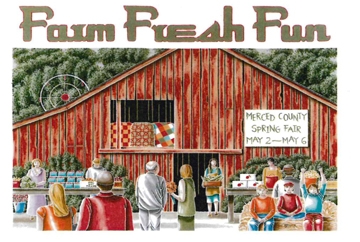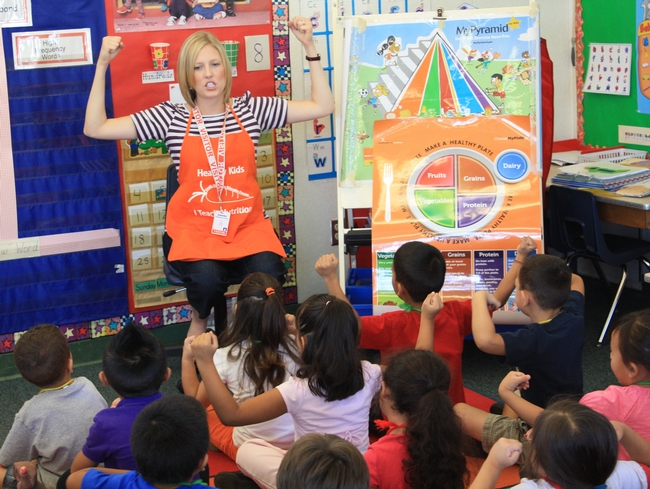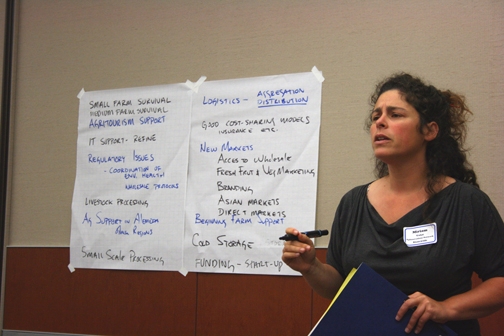
Posts Tagged: collaboration
Encouraging students to eat their vegetables
Which end of an asparagus do you eat? I am not going to eat that, it's too spicy! Pink milk cartons (non-fat) are only for girls.

The collaboration included three components: monthly, school-wide seasonal produce tastings facilitated by UC CalFresh and supported by the school district; Smarter Lunchroom Movement strategies implemented by district food service staff with support from UC CalFresh; and classroom nutrition education with curricula provided by UC CalFresh and implemented by participating classroom teachers.
The monthly produce tastings were a coordinated effort between the UC CalFresh Nutrition Educators, student leaders from the Student Nutrition Advisory Council, and Cafeteria staff. The first goal was to familiarize the students in the five elementary schools with local, seasonal vegetables – and eventually get them on the school menu and on students' plates. During the months of March, April and May of 2015 more than 4,000 students at five participating schools 
Student leaders participated in all aspects of the monthly tastings, from advising on what produce items to sample, to making signs advertising the featured produce, to handing out the samples to their peers. The voting results were overwhelmingly positive with a majority of students in favor of putting Brussels sprouts, asparagus and yellow bell peppers on the school menu. As a result of these findings, and the students' enthusiasm for trying new things, food service staff are working on incorporating a Brussels sprouts salad into their regular menu.
The second component included Smarter Lunchroom Movement (SLM) strategies from the Cornell Center for Behavioral Economics. These strategies were introduced at a cafeteria manager training facilitated by UC CalFresh. At the training, district staff were introduced to SLM concepts and encouraged to identify two changes they wanted to implement in their 
Students, at first surprised seeing adults eating school meals, welcomed the nutrition educators to their tables. Staff took the opportunity to talk to the students about their food, model healthy food habits and dispel myths about their food. Myths included things like pink milk cartons (non-fat) were only for girls and school lunches are unhealthy. By the end of the school year, all participating schools had improved their scores on the Smarter Lunchroom Self-Assessment Scorecard and plans are currently being developed to provide districtwide cafeteria branding.
The third component was the in-class curricula. Classroom curricula has been the primary focus of the UC CalFresh program for many years. UC CalFresh provides “No-Prep Nutrition Education Kits” and in class food demonstrations to enrolled teachers (Educator Extenders). These Educator Extenders teach evidence-based nutrition education lessons based on the 2010 Dietary Guidelines for Americans. This year, as the collaboration with the school cafeteria developed, UC CalFresh staff rolled out the concept of Harvest of the Month mini kits and farm stands to coincide with the produce item being featured in the monthly cafeteria tastings. Educator Extenders had the 
This collaborative effort has brought about many opportunities to educate, expose and inform students and staff about local produce and how delicious it can be in their school lunches. Students who once thought that sweet yellow, green and red bell peppers were too spicy had the opportunity to sample them and see for themselves. Students who did not know which end to eat an asparagus from got to sample it and then vote on whether or not they wanted to try it again. Food service staff also got to see how excited their students were to sample new items, including Brussels sprouts, and have a voice in their school menu.
For more pictures, visit the UC CalFresh Facebook page.
An initiative to maintain and enhance healthy families and communities is part of the UC Division of Agriculture and Natural Resources Strategic Vision 2025.
Fairground farms & farmyard festivals
Do county fairs make you think of deep-fried Twinkies and Ferris wheels, and maybe some prize-winning pigs? Can you imagine a local food marketplace next to the quilt show, a demonstration farm by the pony rides, fresh fruit for sale in the midway, a community dinner honoring local farmers, and housing available for hundreds of farm-workers the week after the fair closes?

“We look forward to working with CDFA’s Division of Fairs and Expositions to expand agritourism opportunities; this will expand revenue sources for California’s small farmers,” said Shermain Hardesty, UC Cooperative Extension specialist in the UC Davis Department of Agricultural and Resource Economics. Hardesty leads the UC small farm program.
Together we are organizing workshops and tours for farmers and agricultural leaders at seven different fairs throughout the state, to be held during fair time in the 2012 fair season. We're calling the project "Fairground Farms and Farmyard Festivals; Showcasing California Specialty Crops."
Each workshop will be a little different, because each of the fairs has it's own unique history and community. We'll hear fair officials sharing with farmers some of their methods for safely entertaining and feeding thousands of people. We'll have presentations by farmers currently involved with local fairs or local agritourism, interactive discussions on potential collaborations between specialty crop growers, agritourism operators and fairs, and guided tours of the fair facilities.

The next workshop and tour will be Thursday July 26 at the Amador County Fair in Plymouth, hosted by Fair CEO Troy Bowers. At this event we will hear from Mountain Mandarin Festival organizer and cookbook author Joanne Neft, as well as from representatives of Farms of Amador, Amador County Grape Growers, and MotherLode Harvest, who all participate in the Amador Fair. Following Amador, we visit Ventura, Napa, Yolo, Santa Cruz and Fresno.
Registration for all of the workshops is now open. We welcome farmers and fair leaders from surrounding counties to each fair workshop, as well as county agricultural commissioners, Farm Bureau leaders, tourism professionals, farm advisors and educators, fair and festival vendors and entertainers and agritourism operators interested in new partnerships.
Let's talk!
The workshop schedule:
Thursday, July 26 - Amador County Fair, Plymouth
Thursday, August 2 - Ventura County Fair, Ventura
Thursday, August 9 - Napa Town & Country Fair, Napa
Thursday, August 16 - Yolo County Fair, Woodland
Thursday, September 13 - Santa Cruz County Fair, Watsonville
Thursday, October 4 - Big Fresno Fair, Fresno
For registration and more information about the events is online or call Penny Leff at (530) 752-7779
See you at the fair!
UC-CalFresh supports school district menu changes through Nutrition Education
If you’ve ever asked a kindergarten student to flex their muscles, you know the smiles and giggles that follow. Their eyes grow wide when they learn about protein foods that help to keep their muscles strong. The UC-CalFresh Nutrition Education Program has the privilege of working with low-income students in Fresno County to combat childhood obesity through nutrition education.

The numbers are jaw-dropping. What’s being done to combat these bleak statistics?

The UC-CalFresh Nutrition Education Program works in close partnership with local school districts, food service directors, and over 900 Fresno County educators. In support of local school districts’ efforts to improve the nutritional value of the meals served, UC-CalFresh has come along side teachers to provide lessons, nutrition education materials, and healthy food demonstrations monthly. With a family-centered approach in mind, we further extend our reach through parent nutrition education classes and workshops.

At the University of California Cooperative Extension, our collaborative efforts are helping build and maintain healthy families and communities.
* Statewide averages in 5th, 7th and 9th are 32percent, 31 percent and 29percent, respectively.
Workshop highlights ways to share trucking, marketing
“We really all wanted to be farmers, not truckers,” said farmer Dru Rivers, while discussing the motivations behind the 1981 founding of YoCal Produce Cooperative.
Now as then, the logistics of moving farm-fresh products from fields to markets — not only transportation, but also cold storage, marketing, sales and food safety coordination — can present a challenge for many small-scale farmers.
Collaboration as a way to meet these needs was the topic of the Collaborating to Access New Markets workshop, which brought together about 40 beginning farmers, experienced farmers, entrepreneurs, students and agricultural professionals June 29 in Woodland.

“Small-scale farmers can accomplish things as a group that sometimes they cannot do as individuals,” said Shermain Hardesty, Small Farm Program director and former director of the Rural Cooperatives Center. “We’re not trying to push the cooperative structure specifically, but just to look at ways that farmers might be able to work together in addressing marketing challenges.”
The day included the first complete history of the pioneering YoCal Produce Cooperative as well as a featured speaker from Pennsylvania, Jim Crawford, who discussed the long-term success of the East Coast’s largest organic produce cooperative.
Hardesty highlighted two critical lessons from collaborative ventures discussed that day, specifically: the importance of collaborative members investing financially in their joint operation and the importance of hiring the right staff, particularly managers.
Farmers Jeff Main of Good Humus Produce and Dru Rivers of Full Belly Farm discussed their experiences as founders of YoCal Produce Cooperative.
“We needed to be able to say ‘You need to pay us before we deliver to you again,’” Rivers said. “As one farmer, that doesn’t work, but as 10 farmers that does work.”
Besides strengthening the farmers’ collective voice and sharing transportation, she also highlighted access to new markets and coordinated crop production as important reasons she and others started the cooperative.
Though no longer in operation, YoCal’s decade of collaboration helped increase the viability of many Capay Valley farms and led to many of the group agricultural ventures currently in the region.
Rivers later shared with the audience insights into the current Capay Valley Farm Shop venture, which started as a brick-and-mortar store but has transitioned into a collaborative CSA that serves corporations in the Bay Area. The Capay Valley Farm Shop is not a cooperative, but does serve some marketing needs for participating farmers.
Jim Crawford shared his more than two decades’ worth of experience leading a collaborative marketing service, Tuscarora Organic Growers. This cooperative is owned entirely by member farmers who share the costs of shipping and marketing to retail grocery stores, food co-ops and restaurants in the Washington, D.C., metro area. The cooperative currently works with more than 50 producers to distribute about 100,000 cases of fresh produce and flowers each year.
But when the cooperative held its first meeting in 1988, there were only five growers and they were unable to secure financing for their venture. They decided to try sharing marketing and sales with some extra capacity offered by Crawford’s own New Morning Farm — including cooling space, trucking capacity, an office and a part-time employee.
“One of our strong points [is] our growth has been steady but slow. We never had one of those times of explosive growth,” Crawford explained.
Crawford identified several other aspects of Tuscarora Organic Growers that he believes helped it succeed from its early days, including grower need, a clear and narrow definition, a strong manager, a founding farm that could spearhead support for the co-op, and diverse growers.
The event ended with a brainstorming session, with break-out groups for beginning farmers, experienced farmers and support professionals.
Participant Vonita Murray started her Mariposa Valley Farm this year, selling produce at the Woodland Farmers Market and working to start a CSA. She is still working a part-time job in addition to farming. “I honestly don’t know how I’m going to survive” as a farmer, she said.
By the end of the workshop, Murray had met neighbors and found some new ideas.
“I know a lot of other small farmers with 3 acres or 4 acres, and I know my next step is to talk to them and see how we can share and collaborate,” she said.
Major accomplishments of YoCal Produce Cooperative
- Marketing and trucking: Collaborating on these tasks allowed farmers the time to grow their farms, sell in the wider market, and be able to make a living. The farmers no longer had to farm all day and drive all night or have one partner support the farm with an off-farm job. “It gave us the confidence that we could make it as small farmers without having another job,” said one member.
- Market entry and increased impact: The cooperative provided entry into the wholesale fresh produce market for some growers and increased market power in the wholesale fresh produce market for others. YoCal raised the visibility of smaller farms, increasing the impact of individual brands by co-marketing under the YoCal label. It eased the growth of several farmers who wanted to grow larger. It was a good transition strategy for them.
- Planning to avoid competition: Although not developed as fully as some members would have liked, the group was able to coordinate some multi-farm plantings and grow some crops recommended by distributor partners.
- Grower education: YoCal improved quality, pack and presentation of product at a time when the organic produce industry was in its formative years. Members learned much about cooperative decision making and how to most efficiently spend their time and energy.
- A sense of community: “We got to know farmers we might not have met otherwise,” said one member. YoCal pulled a divergent group of farmers together and gave them a cohesiveness that they probably would never have developed without it. “Major accomplishments for us, as individuals, are that we, as a community of farmers, are still doing cooperative things together,” said another.
- A model: YoCal was one of the first organic marketing cooperatives in modern times.
– excerpt from "YoCal Produce Cooperative:
The Growers’ Story and the Cooperative Principles"


